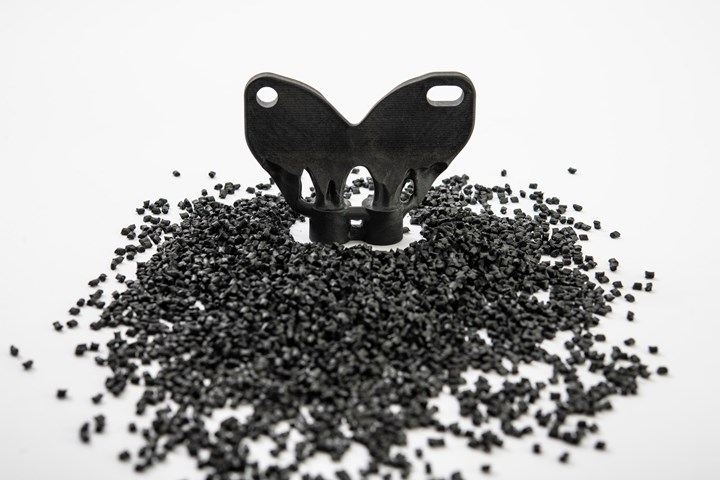Expanded Line of Structural Thermoplastics With New Resin Formulations
Mitsubishi Chemical Advanced Materials has expanded its portfolio of KyronMax structural short carbon fiber thermoplastic compounds.
An expanded line of structural thermoplastic materials with new resin formulations to meet the requirements of applications in the medical, oil & gas, aerospace, automotive, and recreation market segments, is newly available from Mitsubishi Chemical Advanced Materials (MCAM), Mesa, Az. Formed two years ago, MCAM is an operating unit of Mitsubishi Chemical Holdings Group (MCHC) which combined two previous companies purchased by MCHC: Switzerland’s Quadrant AG--which produces glass-mat thermoplastic composites and thermoplastic shapes, and Piper Plastics Inc., Chandler, Az., an injection molder turned compounder that produces injection-moldable, carbon-fiber thermoplastics called KyronMax.

The KyronMax line of structural thermoplastic compounds incorporate MCAM’s short carbon fiber technology, said to offer its customers the strongest moldable polymers available to replace metals such as steel in structural components. Said MCAM technology director Dave Wilkinson,“While we began with a line of high-temperature engineering thermoplastics we have migrated to include the general purpose polymers as well, including polypropylene, nylon and polycarbonate. We’re agnostic in terms of the material we use. If the customer requires nylon 66, we can give them a nylon 66 that is stronger than anything on the market. If they need a polycarbonate, we can give them one that’s stronger than any other material. We’re not trying to force one or two solutions on our customers. We want to produce what our customers require, so we now offer a broad product portfolio.”
As MCAM continued innovating and developing its broad product range, the company broke a barrier in the industry, offering materials with 60,000 psi (414 MPa) tensile strength. According to Wilkinson, these compounds are designed to be user-friendly and easily injection moldable. He noted that metal replacement, particularly in automotive components, has become a part of OEMs lightweighting and sustainability programs. “We’ve done studies on the savings of using KyronMax compounds to replace metal. When you start taking weight out of the material you get a massive CO2 reduction because you don’t need as much fuel to power the vehicle.”
Additionally, KyronMax technology enables very complex parts to be injection molded and retain the strength and mechanical performance of metal, with all the added benefits.
MCAM’s North American Research & Development Technology Center combined what were formerly four facilities into a single, newly-built 100,000 sq.ft. facility where the company develops cutting edge materials in a vertically integrated operation. “We take in raw carbon fiber on a spool and do everything under one roof including chopping, compounding, molding and machining. We sell anywhere along the supply chain whether our customers need the raw materials shipped to their molder’s or require molded parts from their molds which they ship to us,” said Wilkinson.
MCAM’s technology center has 12 injection molding machines ranging from 20 to 700 tons to accommodate customers’ parts requirements. MCAM has technical centers around the world, which allows the company to transfer customers’ molds to other MCAM facilities globally.
Related Content
-
The Fantasy and Reality of Raw Material Shelf Life: Part 1
Is a two-year-old hygroscopic resin kept in its original packaging still useful? Let’s try to answer that question and clear up some misconceptions.
-
What is the Allowable Moisture Content in Nylons? It Depends (Part 1)
A lot of the nylon that is processed is filled or reinforced, but the data sheets generally don’t account for this, making drying recommendations confusing. Here’s what you need to know.
-
Prices for All Volume Resins Head Down at End of 2023
Flat-to-downward trajectory for at least this month.















